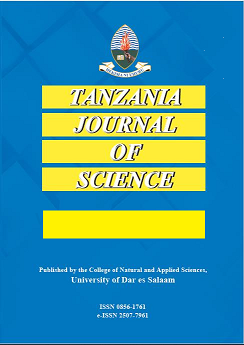Characterization, Antimicrobial and Toxicity Studies of Silver Nanoparticles Using Opuntia ficus indica Leaves Extracts from Effurun, Delta State
DOI:
https://doi.org/10.4314/tjs.v47i1.4Keywords:
Characterization, Antimicrobial, Toxicity, Silver nanoparticles, Opuntia ficus indicaAbstract
The silver nanoparticles were synthesized by reacting silver nitrate, a metal precursor with the extract obtained from the leaves of Opuntia ficus indica, which acts as a reducing and stabilizing agent. Formation of silver nanoparticles was indicated by colour change from light yellow to dark brown which was confirmed by ultraviolet-visible (UV-Vis) spectroscopy showing surface plasmon band at 369 nm resulting from relatively small amount of reductive biomolecules for the silver ion reduction. Scanning electron microscope (SEM) analysis gave the morphology of the nanoparticles and showed that the silver particles were of spherical shape. Fourier transform infrared (FTIR) spectrometer presented the functional groups and it showed that the reduction of silver was as a result of the presence of the absorption band of -OH stretching of alcohols in biomolecules such as glycosides, terpenoids, phenols, and alkaloids which made capping and stability of the particles. The antimicrobial activities of silver nanoparticles were determined using agar well diffusion method with some clinical pathogenic microbes such as methicillin resistant Staphylococcus aureus, Vanocomycin resistant Enterococci, Staphylococcus aureus, Streptococcus pyogenes, Escherichia coli, Klebsiella pneumonia, Proteus mirabilis, Pseudomonas aeruginosa, Salmonella typhi, Candida albicans, Candida krusei, Candida stellatoidea and Candida tropicalis. High anti-microbial activities were seen in Pseudomonas aeruginosa and methicillin resistant Staphylococcus aureus having zone of inhibition of 30 mm and 29 mm with minimum inhibitory concentration (MIC) value of 1.25 mg/L and minimum bactericidal concentration (MBC) value of 2.5 mg/L, respectively. Toxicity study revealed that the silver nanoparticles were not toxic at 100 mg/L indicating that it is eco-friendly.
Keywords: Characterization; Antimicrobial; Toxicity; Silver nanoparticles; Opuntia ficus indica


